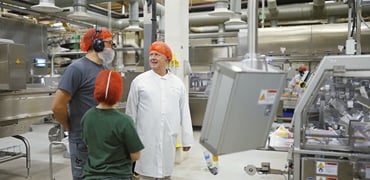Reaching Scope 3 climate targets requires binding partnerships with ambitious suppliers

Lantmännen Unibake is almost halfway on their journey to reach the supplier engagement target of 72% by 2027. But the remaining half is probably going to be the most challenging. It requires tough decision-making and the right prioritizations across the value chain.
Let’s start from the beginning.
Lantmännen Unibake has signed up to the Science Based Targets initiative (SBTi) which means that the company has a clearly defined path to reduce emissions in line with the Paris Agreement.
More than 80% of Lantmännen Unibake’s emissions come from its suppliers. They are so-called Scope 3 emissions: the result of activities not owned or controlled by Lantmännen Unibake but still part of the value chain. Lantmännen Unibake’s target is that 72% of its suppliers have set science-based targets by 2027. We are now in 2024, and Lantmännen Unibake has reached 32%.
“We are almost halfway. We are happy about all the suppliers who have joined us on our journey because we literally can’t do it without them,” says Erik Mansner, Global Sustainability Manager at Lantmännen Unibake. “But it is also clear that we still have work to do. Even though the target is set for 2027, we feel that we are in a hurry.”
A business opportunity
Lantmännen Unibake is also working on reducing Scope 1 and Scope 2 emissions. Those are goals where Lantmännen Unibake is in control. With Scope 3 emissions it’s another story. Here, Lantmännen Unibake and its partners must share the same ambition to set and reach climate goals. Even though signing up to specific climate goals and keeping track of progress will lead to more work, Erik Mansner sees a business opportunity for suppliers.
“We are doing this for the climate, and because we believe that we must take responsibility for our own emissions and for the emissions that are caused by us across the value chain. But we also believe that living up to ambitious climate goals is good business. From that perspective, I think that suppliers who take responsibility are more competitive in the future.”
A need for systematic change
The next step for Lantmännen Unibake on how to reach the 2027 supplier engagement target is to accelerate their plans and go into more detailed dialogues with their suppliers.
“Battling climate change is a global challenge that transcends suppliers, us in the industry, our customers, and the consumers. We are all in this together. When a supplier manages to cut emissions, we all benefit – and vice versa. That’s why we need systematic change and a common mindset fixed around a common goal. The key words are large-scale collaboration and binding partnerships,” Erik Mansner concludes.















